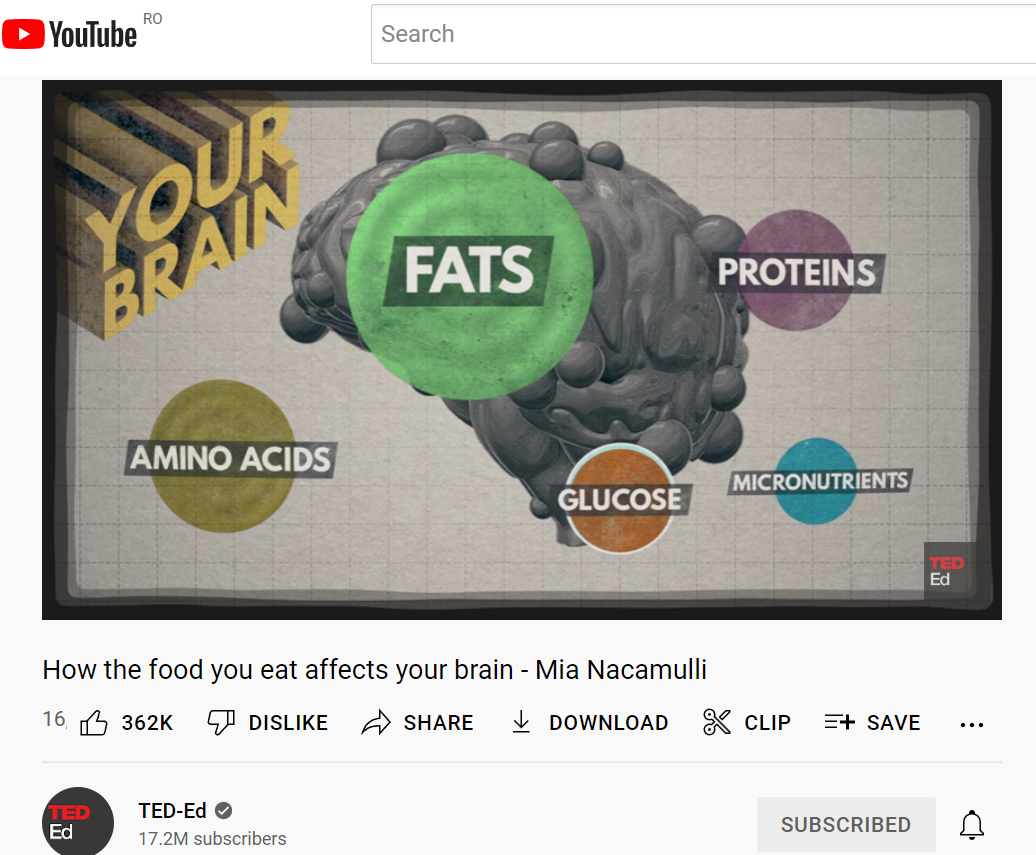In recent years, discussions about nutrition have become an increasingly common topic in the child development literature. What children eat and drink in their early years can influence their later development. General eating habits are formed in the first few years of life; therefore, it is important to help children form balanced and healthy eating routines from an early age.
Nutrition for children: an indicator of a balanced development
The food choices we make significantly influence the functioning of our whole body. A healthy diet, with adequate amounts of nutrients, should be eaten regularly to keep our cells and organs - including the brain - healthy.
The brain is the most complex organ of the human body. Throughout life, the brain monitors our daily operations and activities and communicates with other organs, coordinating their functions. The proper nutrition found in a healthy diet can improve many brain functions, while a poor diet can have a negative effect on our cognitive functions.
Healthy nutrition for children is the foundation of a happy brain!
How nutrition influences brain function
There is a direct relationship between the foods we choose to eat and our brain function. Memory, brain plasticity and flexibility, and logical thinking are just a few of the main areas influenced by the nutrition we build. Proper and healthy nutrition can benefit the brain in several positive ways. In the early years of life, cognitive activity is intense; therefore, healthy eating habits should be formed early and maintained throughout life.
Jacka and Kremer (2011), two specialists in children's nutrition, state that when too many nutritionally poor foods and beverages with high added fats, sugars and salt, such as lollipops, chips and fried foods, are consumed, it promotes emotional and behavioural problems in children and adolescents.
To ensure that children's overall well-being is high, that they have optimal energy levels and that they are training their memory and logical thinking, we need to help them create healthy nutrition routines. A diet with a varied range of foods helps maintain a balanced mix of brain messengers. Like the other organs in our body, the brain also benefits from a steady supply of micronutrients. Antioxidants in fruit and vegetables keep the brain healthy and help it to function in normal parameters for longer.
Without powerful micronutrients such as vitamins B6, B12 and folic acid, our brains would be prone to mental decline. Quantities of minerals such as iron, zinc and sodium are also fundamental to brain health and early cognitive development. The human brain uses about 20% of our energy resources. Most of this energy comes from carbohydrates. Find out more about how the functioning of our brain is fundamentally influenced by the food we eat
here.

Nutrition for children: recommendations of specialists
Experts in the field point out that for a healthy diet for children and for them to have a happy and healthy brain, it is advisable to follow these guidelines and include the following in children's menus:
Carbohydrates:
- Potatoes, bread, rice, pasta, cereals, oats, etc.
- Influences energy levels. Full starchy carbohydrates are the best source of energy for the growing child.
Protein:
- Low-fat meats, dairy products, eggs, soy, fish, etc.
- The growing child should eat fish at least twice a week, especially types of fish with a considerable amount of omega 3 (salmon, sardines, etc.).
Fats:
- Butter, biscuits, pastries, cakes, lard, etc.
- The growing baby needs some fats, but they must be introduced into the baby's diet in the right amounts.
Calcium:
- Milk, yoghurt, cheese, tofu, green vegetables, bread, etc.
- For strong bones and healthy teeth.
Vitamin C:
- Citrus fruits, tomatoes, potatoes, broccoli, berries, peppers, Brussels sprouts
- Immunity, healthy skin, healthy gums and teeth, bones, etc.
Vitamin A:
- Milk, yoghurt, carrots, spinach, red pepper, oranges, eggs, cheese
- For healthy skin, good immune system, healthy eyes.
Vitamin D:
- Eggs, fish oil, cereals, soya, etc.
- Helps in the growth process and keeps muscles and bones healthy.
The maximum daily amount of salt a child should consume according to age: between 4 and 6 years - 3 grams of salt per day (1.2 g sodium); between 7 and 10 years - 5 grams of salt per day (2.0 g sodium); over 11 years - 6 grams of salt per day (2.4 g sodium).
We know that feeding children the right foods contributes to their growth and development. But there is a growing body of research showing that what children eat can affect not only their physical health, but also their mood, mental health and learning.
Research suggests that a healthy and nutritious diet can improve mental health1, enhance cognitive skills such as concentration and memory and improve school performance.
When children eat a healthy diet, with a wide variety of fruits and vegetables in that diet, they perform better in the classroom.
Children are influenced by what they see in people around them. For a healthy diet for children it is essential that the whole family practices a balanced, energetic lifestyle with good nutrition and exercise. It is important to set a good example by eating healthy and together as a family as often as possible. Nutrition for both adults and children is based on the same principles: everyone needs the same types of nutrients - such as vitamins, minerals, carbohydrates, proteins and fats. However, children need different amounts of specific nutrients at different ages and it is advisable to balance the diet, taking into account expert advice.
How Kinderpedia supports weekly menu planning for children
We know how important a child's nutrition is, especially in the early years, but also how difficult it is to rely on what a 3-4 year old child says about the meals they had in kindergarten, what and how much they ate. In the Weekly Meal module you will find all the information about children's daily meals. You also create the menu, add nutritional values and quantities, and then select the children's appetite, so parents have access to all this information in real time and teachers save valuable time if these details would have to be sent through other channels.












